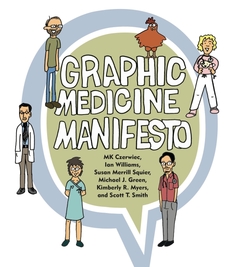My scholarship, since 1990, has been in the general area of feminist science studies, which includes work in literature and medicine, feminist theory and women's studies, disability studies, and the rhetoric of science, medicine, and disability.
At Penn State my courses included doctoral seminars on "Feminist Theory of the '60s and '70s," "Gender and Science: Reproduction"[ in which students read foundational works in science studies and engage in laboratory observation as part of an exploration of the concept of reproduction at three scales (the human, the animal, the bacterial) and from several different perspectives/ locations (literary criticism, feminist theory, cultural and science studies, and agricultural studies)} and Comics Studies, with a specific focus on "Graphic Medicine." In Fall 2016, I taught a graduate seminar, cross listed between Women's, Gender, and Sexuality Studies and English, on "Feminist Cartoonists." And in Spring 2017 (just before my retirement with the Penn State buyout) I taught "Graphic Medicine" as a doctoral seminar.
Medical imaging, scientific illustration and digital visualization technologies, agricultural breed illustration, fashion photography, feminist visual culture, graphic novels, cartoons, visual representations of disability: these are all areas in the general field of visual culture in which I have published. My current work on comics and medicine (see below) expands the notion of rhetoric to include visual rhetorics, and carries over my interest in disability studies to examine comics dealing with intellectual disability.
My most recent book publication, Epigenetic Landscapes: Drawings as Metaphor (Duke University Press, 2017), examines the connections between a specific visual biological model and the realms of comics, landscape architecture, and bio-art and new media. It focuses on the feminist new materialist implications of the concept of the epigenetic landscape (a metaphor/model developed by C.H. Waddington to model individual development).
In production is the volume of essays I co-edited with Irmela Marei Krüger-Fürhoff, PathoGraphics: Narrative, Aesthetic, Contention, Community, to be published by Penn State University Press in the Graphic Medicine series.
At Penn State my courses included doctoral seminars on "Feminist Theory of the '60s and '70s," "Gender and Science: Reproduction"[ in which students read foundational works in science studies and engage in laboratory observation as part of an exploration of the concept of reproduction at three scales (the human, the animal, the bacterial) and from several different perspectives/ locations (literary criticism, feminist theory, cultural and science studies, and agricultural studies)} and Comics Studies, with a specific focus on "Graphic Medicine." In Fall 2016, I taught a graduate seminar, cross listed between Women's, Gender, and Sexuality Studies and English, on "Feminist Cartoonists." And in Spring 2017 (just before my retirement with the Penn State buyout) I taught "Graphic Medicine" as a doctoral seminar.
Medical imaging, scientific illustration and digital visualization technologies, agricultural breed illustration, fashion photography, feminist visual culture, graphic novels, cartoons, visual representations of disability: these are all areas in the general field of visual culture in which I have published. My current work on comics and medicine (see below) expands the notion of rhetoric to include visual rhetorics, and carries over my interest in disability studies to examine comics dealing with intellectual disability.
My most recent book publication, Epigenetic Landscapes: Drawings as Metaphor (Duke University Press, 2017), examines the connections between a specific visual biological model and the realms of comics, landscape architecture, and bio-art and new media. It focuses on the feminist new materialist implications of the concept of the epigenetic landscape (a metaphor/model developed by C.H. Waddington to model individual development).
In production is the volume of essays I co-edited with Irmela Marei Krüger-Fürhoff, PathoGraphics: Narrative, Aesthetic, Contention, Community, to be published by Penn State University Press in the Graphic Medicine series.
Collaborating on PathoGraphics
|
Since 2016 I have been engaged in the PathoGraphics research project, situated at Schlegel Graduate School of Literary Studies (Freie Universität Berlin) and funded by the Einstein Foundation Berlin from 2016 to 2018.
Research project leader: Prof. Dr. Irmela Marei Krüger-Fürhoff, Freie Universität Berlin, in collaboration with Einstein Visiting Fellow Prof. Susan Merrill Squier, Ph.D., Penn State University. For more information on this innovative project, visit the PathoGraphics website. |
Co-Editing Graphic Medicine Book Series
With Dr. Ian Williams, I co-edit the Graphic Medicine book series at Penn State University Press.
See the flyer below.
See the flyer below.
Your browser does not support viewing this document. Click here to download the document.
The Graphic Medicine Manifesto

"This inaugural volume in the Graphic Medicine series [see below] establishes the principles of graphic medicine and begins to map the field..."
See the Penn State UP site for more
I co-authored the book and contributed a chapter on "The Uses of Graphic Medicine for Engaged Scholarship."
Graphic Medicine
I serve as one of the organizers of the annual international conferences on Graphic Medicine--read more here.